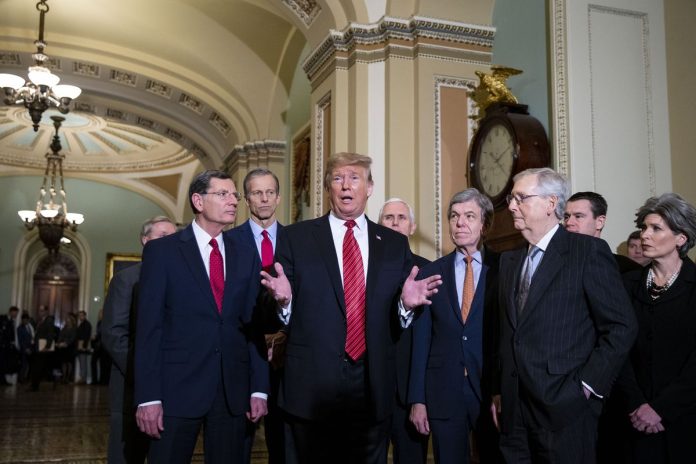Republicans in the Senate now desperately need to rally support for former President Donald Trump, according to The State.
On Monday, the former president won an impressive victory in Iowa with 50 percent of the vote, defeating Florida Governor Ron DeSantis and former South Carolina Governor Nikki Haley.
What it means? That many Senate Republicans see New Hampshire, where the race is tighter but where Trump still leads in the polls, as the last chance to make a meaningful endorsement of Trump’s bid.
After Iowa, he’s, in my view, effectively the presumptive nominee. I think it would have been better before Iowa, certainly better before New Hampshire, but if you wait until the convention floor to endorse the guy then what does it actually say about your convictions? Senator James David Vance, an early Trump endorser, added.
Since early December, 12 Senate Republicans have endorsed Trump’s third White House bid, including several who did so just days before the Iowa election, and a total of 26 GOP Senate members have joined him, giving the former president more than half the conference when he heads to New Hampshire.
Part of Trump’s team’s calculation before the Iowa election was to not only get as many Senate endorsements as possible, but also to win them from figures who would reinforce the perception that the primary was over before it even began.
What this has largely been about is: who can we get to add to the sense of inevitability so they can wrap this up and stop spending money. Who do our voters really care about? Who do the press care about? Who’s a big deal?
The most popular and unusual event in recent memory is that Senator Tim Scott endorsed Trump during Friday’s rally in New Hampshire. The former presidential candidate has kept a low profile since he ended his campaign in mid-November.
Sources said the pressure from Trump’s team has not been harsh, with the former president privately expressing frustration with the lack of support from other senators, including Senator Ted Cruz. The Texas conservative’s endorsement came after the Iowa vote totals were tallied on Tuesday, and Cruz told The Hill that DeSantis’ 30-point defeat tipped the tide in his favour.
I said from the beginning I wanted to let the voters decide. The results in Iowa were compelling. It was a dominating performance, Cruz said.
Also among those trying to boost Trump’s support in the chamber was Senator Steve Daines of Montana, chairman of the National Republican Senatorial Committee and the first member of the GOP leadership to endorse his campaign.
Daines has been quietly lobbying his colleagues over the past month to help Trump’s team win Senate approval.
Every senator has to come to his or her own conclusion and I’ve always been respectful of my colleagues no matter where they land. But I’m encouraging them to get behind the president because he’s going to be the nominee and the sooner that we unify the better off we’ll be for November of ’24, Daines told The Hill.
Sens. Joni Ernst and Chuck Grassley are now free from their vows of neutrality made before the election and are free to voice their opinions on the race. Ernst is considered the most likely prominent member of the GOP leadership to endorse the former president:
“I am going to do whatever it takes to get President Biden out of the White House. Let’s put it like that,” Ernst said.
Senator John Cornyn also dodged a question about supporting the former president and echoed Ernst, saying he would do whatever it takes to defeat Biden.
Marco Rubio of Florida, Trump’s 2016 rival, announced his support for Trump on the eve of the campaign trail, pushing back against his Florida colleague DeSantis. Despite Trump’s dominance, there are several figures who are unlikely to endorse him before officially becoming the GOP nominee, most notably those at the top of the GOP conference.
The highest-ranking Republicans are not expected to join the campaign, some members of the conference want to see unity in support of Trump’s campaign.
